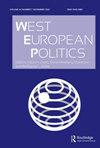Power-seeking, networking and competition: why women do not rise in parties
IF 3.6
1区 社会学
Q1 POLITICAL SCIENCE
引用次数: 1
Abstract
Abstract Why do women fail to rise in parties, especially youth parties? This analysis shows that female party members’ preferences regarding the purpose of a committee, networking and the election rule in party organisations differ from male party members’ which is likely a reason why women face challenges to rise in parties. This article investigates for the first time these gender based differences in preferences simultaneously by conducting a survey experiment with youth party members. Respondents (n > 1200) were asked if they would run for a seat in a decision-making committee of their youth party. In order to analyse which youth party members opt for which opportunities, the purpose of these committees, the networking opportunities they provide, and the election rule for these committees vary at random. The results show that female members hesitate to join committees that would grant them power, and that they are less likely to opt for upward networking opportunities than their male party colleagues. This effect is particularly strong in hierarchically organised youth parties of centre-right parties. Findings on preferred election rules mostly hold for women from left-wing parties. In contrast to men, this group prefers party quotas. Analysing differences by gender and political orientation, this article shows a clear gender preference gap exists both within and across youth parties.权力追求、网络和竞争:为什么女性在政党中没有上升
摘要为什么女性在政党中,尤其是青年党中没有崛起?这项分析表明,女性党员对委员会目的、网络和政党组织选举规则的偏好与男性党员不同,这可能是女性在政党中面临挑战的原因。本文通过对青年党员的调查实验,首次同时调查了这些基于性别的偏好差异。受访者(n > 1200)被问及是否会竞选青年党决策委员会的席位。为了分析哪些青年党员选择了哪些机会,这些委员会的目的、他们提供的网络机会以及这些委员会的选举规则是随机变化的。结果显示,女性成员在加入赋予她们权力的委员会时犹豫不决,而且与党内男性同事相比,她们不太可能选择向上交往的机会。这种影响在中右翼政党的青年党中尤为强烈。关于首选选举规则的调查结果大多适用于左翼政党的女性。与男性相比,这一群体更喜欢政党配额制。通过分析性别和政治取向的差异,本文表明,青年党内部和内部都存在明显的性别偏好差距。
本文章由计算机程序翻译,如有差异,请以英文原文为准。
求助全文
约1分钟内获得全文
求助全文
来源期刊

West European Politics
POLITICAL SCIENCE-
CiteScore
10.00
自引率
7.10%
发文量
58
期刊介绍:
West European Politics (WEP)has established itself as one of the most authoritative journals covering political and social issues in Western Europe. It has a substantial reviews section and coverage of all national elections in Western Europe. Its comprehensive scope, embracing all the major political and social developments in all West European countries, including the European Union, makes it essential reading for both political practitioners and academics.
 求助内容:
求助内容: 应助结果提醒方式:
应助结果提醒方式:


